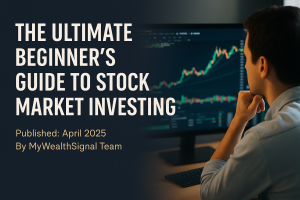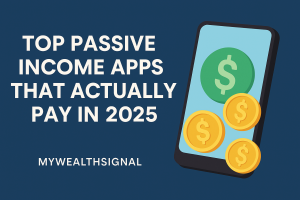
ARTICLE
Guaranteed High Returns with No Risk – A Big Red Flag: If someone promises you “guaranteed” profits or absurdly high returns (“Earn 50% every month with zero risk!”), that’s your cue to be skeptical. In legitimate investing, no return is ever guaranteed, and higher potential gains always come with higher risk. Scammers, however, often lure victims by claiming huge payouts with little or no downside. They might use testimonials of people doubling their money in weeks, or “secret algorithms” that can’t fail. Remember: if it sounds too good to be true, it probably is. No real investment professional will promise consistent, rapid, high returns – even the stock market’s long-term average growth is around 7-10% annually, and that comes with ups and downs. So when a scheme claims you’ll get, say, 30% monthly with “absolute safety”, it’s almost certainly a scam. The best defense is a good offense here: educate yourself on normal market returns (so you recognize what’s unrealistic), and be wary of any “guarantee” or pressure to invest quickly. Real investments involve risk (as we covered in Risks of Investing and How to Manage Them on this site), and anyone telling you otherwise is not being honest.
Unlicensed or Unregistered Platforms: Another hallmark of an investment scam is a platform or “advisor” that isn’t licensed or registered with any reputable financial authority. Thanks to the internet, it’s easy for scammers to set up official-looking websites or apps that mimic legitimate brokers or crypto exchanges. They’ll take your money – and often, you won’t realize you’ve been had until you try to withdraw funds (only to find you can’t). Before investing through any new platform, do some homework: check if the company is registered with your country’s financial regulatory body (for example, in the US, legitimate investment companies or advisors should be registered with the SEC or FINRA). Most countries have an online database you can search. If you can’t find any record of the platform or person, that’s a big warning sign. Even in the burgeoning crypto space, reputable exchanges are now well-known and often regulated; a random new “crypto trading app” promising 100x gains might be just a trap to steal your deposits. Also be cautious of platforms that do register but in overseas jurisdictions with lax oversight – it might be legal, but if something goes wrong, you may have no recourse. Always prefer well-known, regulated financial institutions or exchanges for your investment needs. A little due diligence upfront can save you from losing money to a fraudulent website.
Heavy Pressure Tactics and Urgency: Scammers often use psychological pressure to get you to send money before you have time to think it over. You might encounter pitches that say things like, “Offer ends tonight – invest now or miss out!” or receive incessant phone calls and messages once you’ve expressed interest, all pushing you to act immediately. Legitimate investments rarely require you to act on the spot. Be extremely wary of any opportunity that pressures you to decide right now, won’t let you do your own research, or discourages you from consulting others. High-pressure tactics are a sign that the seller doesn’t want you to have the time to discover their scheme. Similarly, be cautious of “free seminars” or webinars that end with a hard sell to invest then and there. A real financial opportunity will still be there tomorrow; a scam might disappear with your money by then. Take your time, ask lots of questions, and if the answers are vague or the pressure increases, walk away. Scammers often hate questions – an honest investment provider will gladly answer them and won’t mind you taking time to decide.
The Pump-and-Dump Hype Machine: One common type of scam, especially in stock and crypto markets, is the classic pump-and-dump scheme. Here’s how it works: Scammers will heavily promote a particular stock or coin – often a very cheap “penny stock” or a new cryptocurrency – through mass emails, social media, forums, or even ads. They’ll paint it as “the next big thing” and claim you’ll regret not buying in. As naïve investors rush to purchase, the price jumps (that’s the pump). What these investors don’t know is that the scammers already hold a large amount of that asset. When the price peaks from the frenzy, the scammers dump their holdings – selling everything. The flood of sell orders causes the price to crash, leaving latecomers with heavy losses. Meanwhile, the pump-and-dump orchestrators walk away with profits. To avoid this, be very cautious of unsolicited tips or viral posts about a “can’t-miss” penny stock or unknown crypto coin. Ask yourself: Why is this person or newsletter pushing so hard for me to buy it? Check the source – if it’s not a reputable financial news outlet or analyst, you likely shouldn’t trust it. Also, look at the trading volume and history of the asset; pump-and-dumps often involve assets with low trading volume (easy to manipulate). As a rule, base your investments on research or advice from professionals, not on hype from strangers on the internet. If you do see an exciting claim, try to verify it through credible sources. Nine times out of ten, you’ll find it’s exaggerated or false.
Phishing Scams and Impersonation: Not all investment scams involve a fake investment product – sometimes the product is real, but the people contacting you are fake. Be on the lookout for phishing emails or messages that impersonate legitimate financial institutions. For example, you might get an email that looks like it’s from your bank or brokerage firm, asking you to log in and “verify” your account or to “authorize a large transfer.” The email will conveniently include a link – which leads to a fake login page where, if you enter your credentials, the scammers will steal your username and password. Always verify such communications: a broker or bank will never ask for your password via email, and they typically won’t initiate an email asking you to log in out of the blue. If you receive a suspicious email, check the sender’s address closely (scammers will use addresses that look similar to the real company, but often with slight misspellings). It’s best not to click links in any unexpected finance-related emails; instead, go directly to the official website yourself or call the company’s customer support to confirm if there’s an issue. Similarly, beware of imposters on social media – for instance, scammers might create a fake profile pretending to be a well-known investment guru or even pretend to represent MyWealthSignal or another brand, offering “special investment programs.” Treat any direct messages offering investment deals as suspect. Legitimate firms don’t typically slide into your DMs with secret offers. In short, protect your personal information and account credentials as diligently as you protect your money. Use two-factor authentication on your financial accounts for an extra layer of security (so even if someone phishes your password, they can’t get in without your phone or code). Being tech-savvy and cautious with communications will help you avoid these trapdoors.
Ponzi Schemes and Multi-Level Marketing Pitches: Some scams are less about fake websites and more about fake business models. A Ponzi scheme is a fraudulent setup where earlier investors are paid returns using the money from later investors. There’s actually no real profit being made in the background – it’s just shuffling money around, and it collapses when new people stop joining. Classic Ponzi schemes often masquerade as investment funds or “high-yield programs.” They might even pay you small returns at first (with another investor’s money) to gain your trust, encouraging you to invest more – until it all disappears. Multi-level marketing (MLM) scams are a close cousin: while not all MLMs are scams, many unscrupulous ones emphasize recruiting other people under you rather than selling a real product. If you’re told that the way to riches is by recruiting X people, who each recruit X more people, and so on, be very cautious – pyramid schemes are illegal and inevitably collapse, because you eventually run out of new recruits. When evaluating any business or investment opportunity, focus on where the real economic value comes from. Is there an actual product or investment generating returns, or does it depend mainly on bringing in new money from others? If it’s the latter, walk away. Remember Bernie Madoff’s Ponzi scheme – it ran for years and fooled many smart people, but the signs were there (steady “too good to be true” returns and secrecy about how profits were made). Don’t let greed overpower diligence: ask for detailed explanations of how profits are generated and verify if possible. If you can’t get a clear answer, that’s a red flag.
How to Protect Yourself: We’ve covered a lot of scam tactics, but the overarching theme is vigilance. Here’s a quick recap of protective steps, wrapped into a few key principles. First, do your research: whether it’s an unknown platform, a new cryptocurrency, or a hot stock tip, take the time to investigate. Five minutes on Google can save you from a world of trouble. Look up the company’s name with keywords like “scam” or “complaint” and see if others have reported issues. Check official sources for licensing or registration. Second, be skeptical of everyone trying to sell you something aggressively in the financial world. That doesn’t mean you need to distrust legitimate financial advisors – but any who guarantee results or push too hard are not adhering to ethical standards. Trust your gut. If you feel uncomfortable or something doesn’t add up, you’re not obligated to invest. It’s far better to miss a “maybe legit” opportunity than to fall into a definite scam. Third, keep learning about finance. The more you know, the harder it is for scammers to fool you. (For example, if you understand that sustained 40% yearly returns are virtually impossible, you won’t be tempted by someone promising that.) Making sure you have a solid financial education is truly your best defense – in fact, building your knowledge base is your best investment in the long run (as we say in Why Financial Education Is Your Best Investment). Finally, stay calm and don’t let FOMO (fear of missing out) drive you. Scammers love to exploit FOMO – the feeling that everyone else is getting rich except you. Remember that successful investing is a marathon, not a sprint. If you pass on a sketchy offer, there will always be real opportunities down the road. By keeping a level head, doing due diligence, and sticking to proven financial principles, you can avoid the vast majority of scams out there.
Conclusion: In the online era, investment scams may take many forms – from Ponzi schemes, flashy “can’t lose” programs, to phishing emails – but they all rely on catching you off-guard or uninformed. By staying informed, skeptical, and patient, you can enjoy the genuine wealth-building opportunities (stock market, real estate, legitimate business ventures, etc.) and skip the frauds. Every time you encounter a new opportunity, take a step back and apply the checks we discussed: Does it sound realistic? Is the person/platform legit? Is there pressure to act fast? Trust is earned, especially where your hard-earned money is concerned. With the knowledge of scam red flags and a commitment to protecting your financial future, you won’t be an easy target. Instead, you can focus on real investments – and sleep easier at night knowing you’ve sidestepped the scams that derail so many others. Invest safely out there!
More Related Articles Below

With easy cash-out options, get your earnings quickly and efficiently. Whether it’s gift cards from top brands or real money rewards, Cash’em All has got you covered. With easy cash-out options, get your earnings quickly and efficiently.With easy cash-out options, get your earnings quickly and efficiently. Whether it’s gift cards from top brands or real money rewards, Cash’em All has got you covered. With easy cash-out options, get your earnings quickly and efficiently.
Copyright © 2025 My Wealth Signal. All rights reserved.






